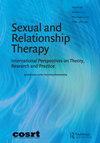“性瘾”疗法的宗教伪装
IF 1.4
4区 心理学
Q3 PSYCHOLOGY, CLINICAL
引用次数: 1
摘要
在这篇文章中,我将讨论与宗教立场相关的“性瘾”项目和治疗的概念化。性瘾匿名者协会的官方书籍和“性瘾”专家都宣称提供一种非宗教的解决方案,适合所有患有“性瘾”的人,然而,对一些当前文本的简要概述显示出强烈的宗教性。在大众话语中,由于其清教徒的历史,美国通常被认为比英国更虔诚。虽然英国被认为是更“积极的性”,但我将证明,在英国的“性瘾”专家中,宗教信仰也很强烈,也许更隐蔽。这篇文章涵盖了在性强迫治疗中整合12步方案的问题。我将挑战“性瘾”的概念,主要是专家如何促进支持团体,如SAA和SLAA。这些支持团体的理念与性学知识和一些基本的心理治疗原则直接矛盾。我认为,将12步哲学(并在未经客户同意的情况下插入宗教信仰)纳入治疗可能会使性强迫症变得更糟,因为这会增加羞耻感,并与治疗师和客户之间的权力不平衡相结合。我认为,既要“性积极”,又要推广“性瘾”的概念是不可能的。本文章由计算机程序翻译,如有差异,请以英文原文为准。
The religious disguise in “sex addiction” therapy
ABSTRACT In this essay I will discuss the conceptualisation of “sex addiction” programmes and treatments in relation to its religious positions. Both the official book of Sex Addicts Anonymous and “sex addiction” experts proclaim to offer a non-religious solution suitable for all people suffering from “sexual addiction” however a brief overview of some current texts reveals strong religiosity. In popular discourse, the USA is often perceived as more religious than the UK because of its puritan past. Whilst the UK is perceived to be more “sex positive,” I will demonstrate that religiosity amongst “sex addiction” experts in the UK is also strong, and perhaps more covert. This essay covers the problematic use of the integration of 12-step programmes in therapeutic treatments for sexual compulsivity. I will challenge the conceptualisation of “sex addiction,” primarily how experts promote support groups such as SAA and SLAA. The philosophy of these support groups is in direct contradiction with the knowledge of sexology and some basic psychotherapy principles. I argue that incorporating a 12-step philosophy (and inserting religiosity without client’s consent) into therapy can make sexual compulsivity worse because of increasing shame and colluding with a power imbalance between therapist and client. I propose that it is not possible to be both “sex positive” and promoting the conceptualisation of “sex addiction.”
求助全文
通过发布文献求助,成功后即可免费获取论文全文。
去求助
来源期刊

Sexual and Relationship Therapy
PSYCHOLOGY, CLINICAL-
CiteScore
3.80
自引率
9.10%
发文量
37
期刊介绍:
Sexual and Relationship Therapy is a leading independent journal in its field, well established and internationally recognized. It offers an active, multidisciplinary forum for review and debate across the spectrum of sexual and relationship dysfunctions and therapies. The journal presents original research and best practice and is a vehicle for new theory, methodology, and application. Sexual and Relationship Therapy is edited by a respected international team and publishes contributions from around the world. It is the official journal of the British Association for Sexual and Relationship Therapy (BASRT).
 求助内容:
求助内容: 应助结果提醒方式:
应助结果提醒方式:


